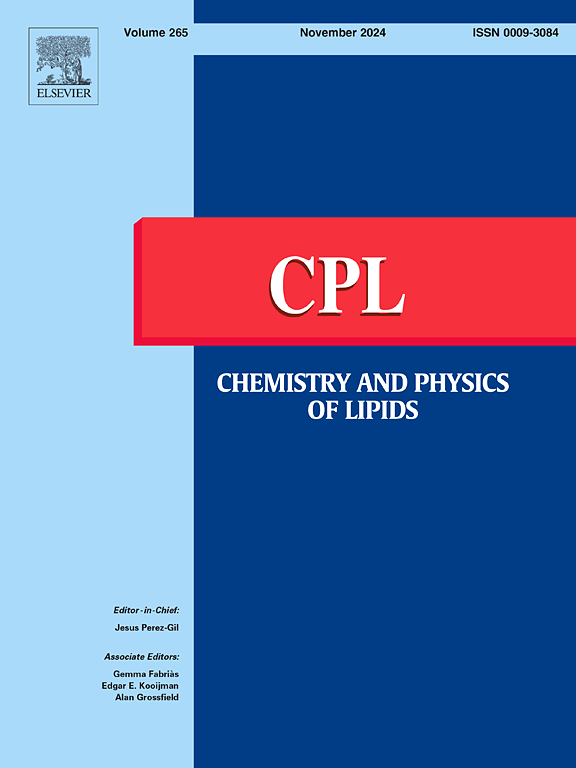The pleomorphic cholesterol sensing motifs of transmembrane proteins
IF 2.8
3区 生物学
Q2 BIOCHEMISTRY & MOLECULAR BIOLOGY
引用次数: 0
Abstract
Millions of years of phylogenetic evolution have shaped the crosstalk between sterols and membrane-embedded proteins. This lengthy process, which began before the appearance of eukaryotic cells, has sculpted the two types of molecules to cover a wide spectrum of structural interconnectedness, ranging from rapid touch-and-go hits of low-affinity between surfaces to stronger lock-and-key type structural contacts. The former usually involve relatively loose contacts between linear amino acid sequences on the membrane-exposed transmembrane domains of the protein, readily accessible to the sterols as they briefly visit clefts between adjacent transmembrane segments while in rapid exchange with the bulk lipid bilayer. This operational mode is probably the most ancestral one, since it was already present in primitive bacteria interacting with hopanoid lipids. At the other end of this spectrum are more complex cholesterol binding sites that have required the acquisition of complex 3D non-sequential segments of the membrane protein to establish stereochemically elaborate 3D designs complementary to the rough and smooth surfaces of the eukaryotic neutral lipid, cholesterol. This short review explores cholesterol-membrane protein interactions using membrane protein paradigms having in common their participation in intercellular communications neurotransmission, hormone signalling, amino acid/neurotransmitter transport- and in cancer.
跨膜蛋白的多形性胆固醇感应基序
数百万年的系统进化形成了固醇和膜内蛋白之间的相互作用。这个漫长的过程始于真核细胞出现之前,它塑造了两种类型的分子,覆盖了广泛的结构互联性,从表面之间低亲和力的快速触碰到更强的锁-钥匙型结构接触。前者通常涉及蛋白质跨膜结构域上的线性氨基酸序列之间相对松散的接触,当甾醇在与大量脂质双分子层快速交换时,它们会短暂地访问相邻跨膜段之间的间隙,从而很容易接近。这种操作模式可能是最古老的一种,因为它已经存在于与类hopanoid脂相互作用的原始细菌中。在这个光谱的另一端是更复杂的胆固醇结合位点,需要获得膜蛋白的复杂3D非顺序片段,以建立立体化学上精细的3D设计,以补充真核中性脂质胆固醇的粗糙和光滑表面。这篇简短的综述利用膜蛋白范式探讨了胆固醇与膜蛋白的相互作用,它们共同参与细胞间通讯、神经传递、激素信号、氨基酸/神经递质转运以及癌症。
本文章由计算机程序翻译,如有差异,请以英文原文为准。
求助全文
约1分钟内获得全文
求助全文
来源期刊

Chemistry and Physics of Lipids
生物-生化与分子生物学
CiteScore
7.60
自引率
2.90%
发文量
50
审稿时长
40 days
期刊介绍:
Chemistry and Physics of Lipids publishes research papers and review articles on chemical and physical aspects of lipids with primary emphasis on the relationship of these properties to biological functions and to biomedical applications.
Accordingly, the journal covers: advances in synthetic and analytical lipid methodology; mass-spectrometry of lipids; chemical and physical characterisation of isolated structures; thermodynamics, phase behaviour, topology and dynamics of lipid assemblies; physicochemical studies into lipid-lipid and lipid-protein interactions in lipoproteins and in natural and model membranes; movement of lipids within, across and between membranes; intracellular lipid transfer; structure-function relationships and the nature of lipid-derived second messengers; chemical, physical and functional alterations of lipids induced by free radicals; enzymatic and non-enzymatic mechanisms of lipid peroxidation in cells, tissues, biofluids; oxidative lipidomics; and the role of lipids in the regulation of membrane-dependent biological processes.
 求助内容:
求助内容: 应助结果提醒方式:
应助结果提醒方式:


